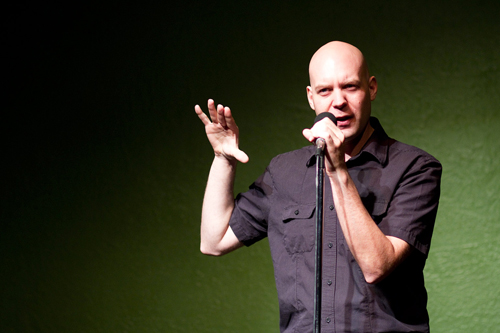Who doesn’t have a unique sex story they’ve been dying to tell?For more than a year now, a storytelling series called the Mystery Box Show has provided a platform for Portlanders to craft and share their personal tales of sexual misadventure. Some stories are tragic, many others are embarrassingly funny, but the series creator aims to show audiences that stories centered around genitalia can actually come from the heart.
Show provides platform for intimate storytelling

Who doesn’t have a unique sex story they’ve been dying to tell?
For more than a year now, a storytelling series called the Mystery Box Show has provided a platform for Portlanders to craft and share their personal tales of sexual misadventure. Some stories are tragic, many others are embarrassingly funny, but the series creator aims to show audiences that stories centered around genitalia can actually come from the heart.
“Everybody’s interested in sex—well, almost everybody,” Mystery Box Show creator Eric Scheur said. “But the show is really about the art of storytelling, and the fact that it’s all about sex is secondary.”
Scheur has been a fan of storytelling and stand-up comedy for many years. He started the Mystery Box Show, which is held every other month, in April 2012. Since then the show has grown in popularity, with the last several shows selling out earlier than ever. The next show will be held Aug. 22 at Brody Theater in downtown Portland.
“We’re definitely gaining ground, and that’s really flattering to me,” Scheur said. “But I don’t think people would keep coming back if it was just people saying dirty words onstage.”
As the name might imply, the show is a bit of a mystery to some people. Initial notions about what the show entails range from pornographic spectacle to stand-up comedy. In actuality, the show falls somewhere in between.
“It’s my goal to have as broad a scope of sexuality as possible,” Scheur said. “As long as the story is tied to sex in some way, it’s fair game.”
Each show features five storytellers who share their personal 10- to 15-minute story, unscripted and without notes. It’s a similar format to other storytelling events like the Moth Radio Hour.
Scheur has invited specific, well-known storytellers for past shows, but many participants are just ordinary people who pitched ideas through the show’s website.
Once a story is accepted, Scheur works with the storyteller through a coaching process and fits them into a show where they will mesh well with the rest of the night’s stories.
“It’s not totally formulaic, but for each show I try to keep a variety of stories and not beat the audience over the head with the same type of story,” he said. “Some stories can be pretty heavy, and I don’t shy away from them, but I try to keep those to one a show.”
Scheur has even told a couple of stories himself. He is resistant, however, to being the focus of Mystery Box. His priority is to help others craft their stories and to help them connect with an audience, which he described as being like putting a puzzle together. By now, he has developed a pretty good sense of what works and what doesn’t.
“The most successful stories tend to focus on a specific incident,” Scheur explained. “But there was one guy who wanted to tell the story of, basically, a 30-year, on-and-off love affair. Thirty years is a lot to fit into 15 minutes. It took a lot of work to do it, but it’s been one of my favorite stories in the show.”
Scheur feels that a lot of the importance of the show comes from the lengthy coaching process. He said that the process tends to delve into territory that makes the individual think hard about their story, changing it from just a simple anecdote to something much bigger.
“There’s something a little therapeutic about it,” he said.
Scheur feels that the show’s therapeutic quality extends to audience members as well, who may find strength in hearing stories about situations they’ve also experienced but have been too embarrassed to talk about themselves.
“I think people get all sorts of different types of things from it,” Scheur said.
“For some people it’s just a rush of letting themselves be vulnerable in front of a crowd, but all good stories have emotions that people can recognize, and hopefully it can help some people realize they’re not alone in their insecurities.”
To learn more about the show or to pitch a story, visit mysteryboxshow.com.





